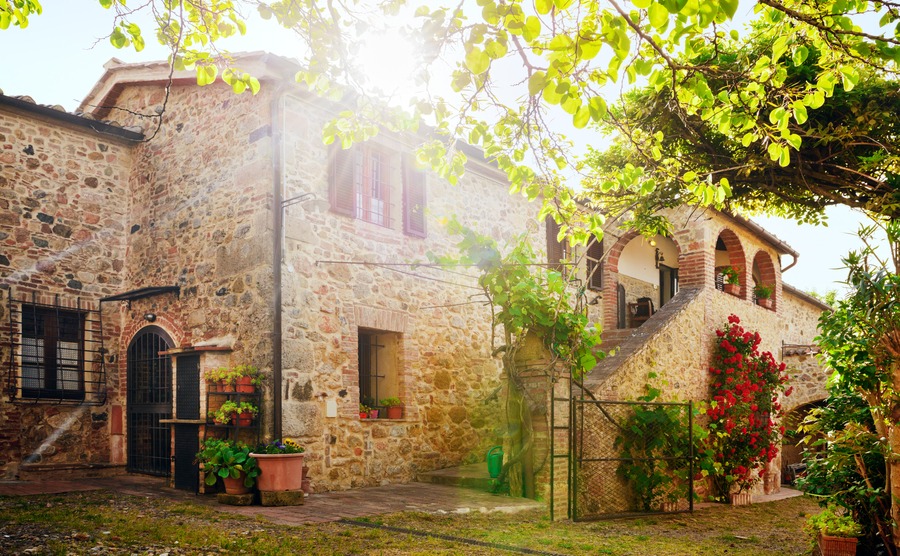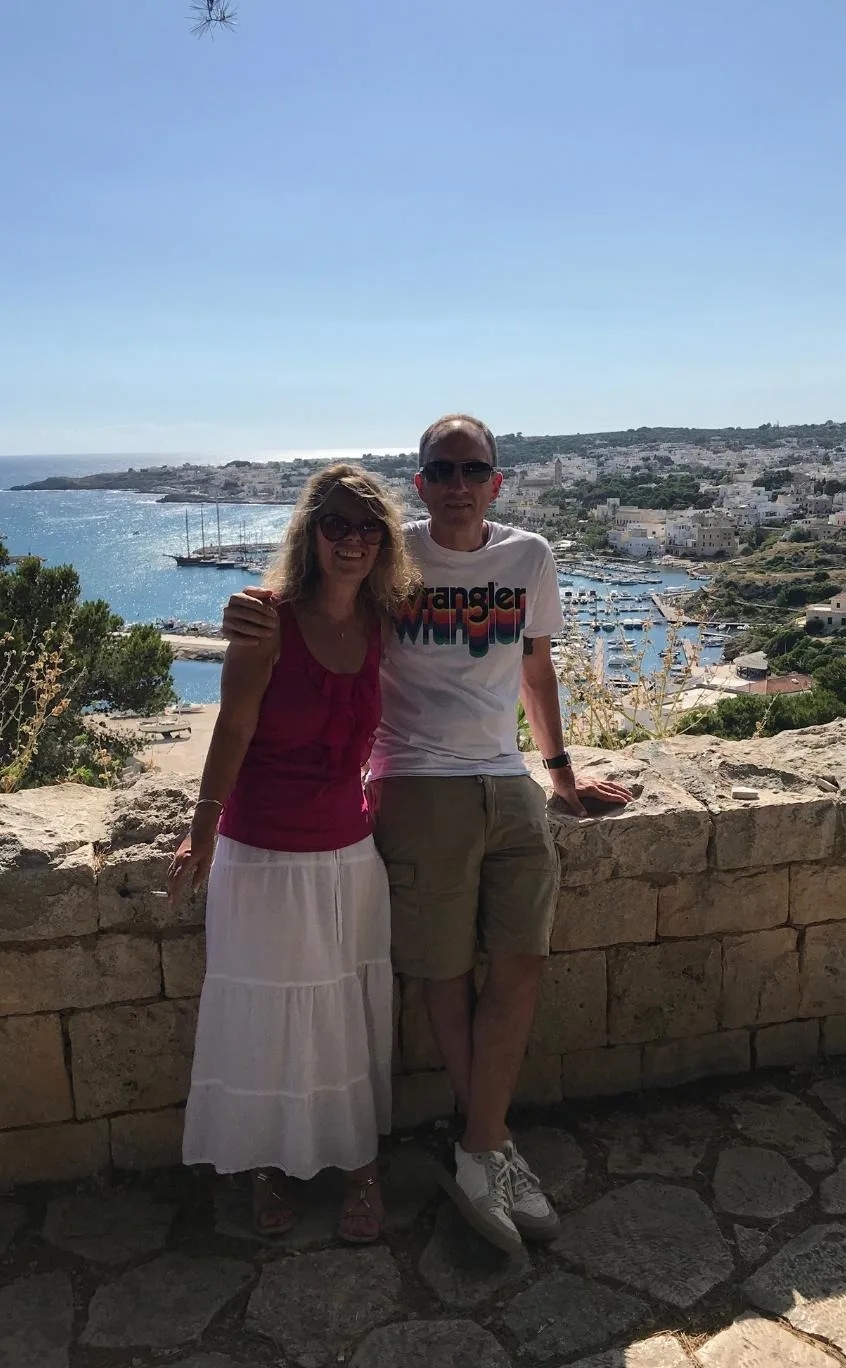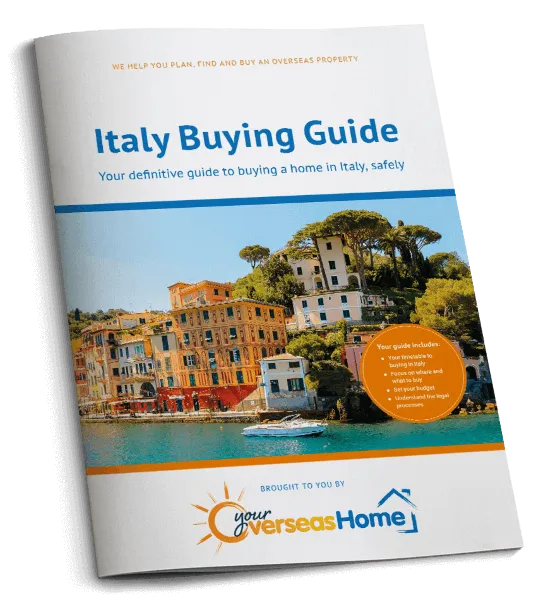In a country that attracts over 52.4 million tourists each year, there are plenty of potential B&B clients to go around.
The varied landscape and beautiful cities and villages invite people to explore and immerse themselves in the culture and cuisine of each place they visit. Therefore, many tourists like the freedom to move around and spend a few days in each place or take regular weekend breaks. Italians are very proud of their food, architecture and traditions, and visitors like to stay in a typical Italian home that offers a warm welcome, a breakfast using local produce and comfortable rooms.
In a country that attracts over 52.4 million tourists each year, there are plenty of potential clients to go around.
More and more property buyers have been looking at large Italian houses, with the idea of running a B&B. These properties range from rustic farmhouses amongst stunning countryside scenery to Palaces (Palazzo) in the charming historic centres of Italian towns. Many chose to buy a historic building requiring renovation and make the adjustments to the layout to make it more convenient for the needs of guests. When starting up a business from scratch in this way you have the freedom to present the property how you choose. However, getting planning permissions, carrying out renovation work and connecting utilities can take longer than you might expect. So, you need to make sure that you can afford to live without the B&B income while this is all going through at the relaxed pace Italy is famous for.
Find homes in Italy via our property portal.
Where to open a B&B in Italy
There are over 32,000 B&Bs operating across the country, with art cities like Florence, Venice, Palermo and Naples attracting a large bulk of the visitor numbers. B&Bs in these cities are able to offer visitors the opportunity to explore the beautiful architectural surroundings at any time of day. Guests can beat the day visitors to the museums and galleries in the morning and experience the lights, music, restaurants and bars in the evening. In Rome and Milan there are also a huge amount of professional people on business trips, who may prefer a homelier B&B than an impersonal hotel. Other popular cities include Turin, Palermo, Bologna and Verona. Property prices are high in the cities, but in a good location you can also expect to earn good room rates. However, you may find that one of the smaller towns near tourist attractions and good road, rail and air links will give you a better profit margin and their may be less competition from other accommodation providers.

Where will you decide to open your very own B&B in Italy?
The Italian Ministry for Tourism actively tries to encourage people to explore areas of the country beyond the well-trodden tourist routes. Their aim is to promote sustainable tourism and authentic hospitality in family surroundings. They also encourage hosts to pass on their knowledge of local culture, traditions, food and products. Therefore, buying a property in the countryside or one of the pretty villages can actually work very well if you have the skills to market your business effectively on the internet and enjoy sharing your tips and local knowledge with guests. The “Italia” tourism website promotes visiting “Borghi italiani” (Italian villages) and you can find information about some of the most beautiful villages in Italy at “Viaggio-italiano” and “I Borghi piu belli d’italia” Many of these villages have various annual festivals that bring in the crowds at particular times of year.
Who stays in an Italian B&B?
When choosing a property to turn into a B&B, it’s important to research who your potential guests are likely to be. This will vary depending on what attractions are in the area. UNESCO world heritage sites may attract different clientele compared to city nightlife. This information may also influence the way you set up your rooms. For example, should you supply twin or double rooms. According to an Istat report the average age of tourists choosing to stay in Italian B&Bs is between 25 and 40 years (over 75%). 85% of the visitors are couples and 54% of the guests stay for two nights. 38% of guests indicated that their selection of a B&B was mainly based on its cosiness and 33% said it was the warm welcome. Surprisingly, only 4% indicated that the price was the main factor. The largest number of foreign visitors to Italy come from Germany, around 11 million a year. This is followed by the United States of America, France, China and the United Kingdom.
The more languages you speak the larger your potential market as foreign visitors tend to look for accommodation that has a host that speaks at least the basics of their language. Over 76% of people arrive at their holiday accommodation by car, so parking for your guests can often be an issue, especially in cities and small villages.
Who hosts Italian B&Bs?
B&B owners in Italy are generally well-educated people who have some business experience. Often if it is a couple, one will also continue with other employment while the other takes on the role as B&B host. In most cases it is women that take on this role. In a study by Istat in 2016 they found that 36% of the B&B owners were freelancers or entrepreneurs, 15% were office workers and 6% teachers. They also found that 46% of the owners spoke two foreign languages, and 90% speaks at least one, mainly English.
How to register your B&B
Once you have bought your ideal property make sure it conforms to current gas and electricity regulations and is in overall good condition. You will need to visit the information office at your local Town Hall (comune), which is called SUAP (Sportello Unico Attività Produttiva), to get an official form to declare your new B&B is starting. It is called SCIA (Segnalazione Certificata di Inizio Attività), your region may also make the form available online.
You will need also to enclose a variety of documents with your SCIA, these vary according to regional legislation but are likely to include a plan of the property, deeds of property ownership and your B&B insurance policy. Insurance for your guests isn’t necessary but it is a good idea to cover them for any damage they may cause. This type of insurance is called “polizza assicurativa di responsabilità civile”. There will also be a fee for processing your SCIA which can range between €30 and €150, depending upon your region. It’s advisable to get a local professional to help you with gathering the correct documents for your application such as a lawyer, accountant or architect.
Once you have bought your ideal property make sure it conforms to current gas and electricity regulations and is in overall good condition
Below I have given a rough guide to the requirements for opening a B&B in Italy, but each Italian region has different regulations regarding the numbers of bedrooms you can let, number of days you can operate, the size of the rooms, minimum furnishing requirements etc. So check them out carefully with your local “Comune”. There are two types of B&B, firstly there is your small family run set up and then there is your more entrepreneurial serviced business activity.
Family run B&B
Family run B&Bs are very much encouraged, as they are seen as a way for people in the countryside and remote villages to subsidise their incomes while at the same time encouraging visitors to their area, which in turn brings customers to local bars, restaurants and shops. This classification is for those who, in their own home (one unit), provide bed and breakfast in no more than three rooms and nine beds, taken care of entirely by your family members. Commonly, you will be restricted to offering the rooms for a minimum of 90 and a maximum of 270 days a year. The activity of a family-run B & B does not require registration in the business register and has some tax benefits. Income tax is paid, but you are not required to charge visitors VAT.
Entrepreneurial B&B
An entrepreneurial Bed and breakfast is a business that is continuously and professionally carried out by the property owners in their own home. You are allowed to provide accommodation and breakfast in no more than six rooms and eighteen beds and can use hired help. It can be carried out in one unit, two units in the same building or two buildings no further than hundred metres apart on foot. The B&B is required to be registered, pay income tax and charge VAT.
How to advertise your B&B?
Look out for visitor attractions in the area your property is situated, such as national parks, hiking and cycling paths, ski slopes, wine routes, archaeological sites, famous restaurants, golf courses, Palace gardens and castles etc. When it comes to advertising your B&B you want to be able to give visitors as many reasons as possible to make the journey to your B&B over any other. Even at the property purchase stage you should ask yourself how photogenic the property is, as often it is just one stunning photo among many others on a website that attracts a potential client to click the “More info” button. Most people book accommodation online and there are a number of websites you can advertise on such as: Bed-and-breakfast.it, tripadvisor, Airbnb and bbitalia.it. You should also create a Facebook business page and a blog or website, as something to refer people to for further information.
If you are ready to buy in Italy, you’ll have a few financial matters to sort out. For advice on getting the best currency deal download the Property Buyer’s Guide to Currency.
Spreading the word through ex-work colleagues, friends and family can help get you started with a few guests that will give you some glowing reviews. Good signage and an attractive property façade may bring in the occasional passing trade. It’s worth building up a good relationship with local bars and cafes, whereby you recommend them to guests and they in turn recommend your B&B. Business cards and leaflets are useful to give to the local tourist office and other businesses.
Case Study
Darrell (aged 46) and Debbie (aged 51), have recently made the move from Lincolnshire, England to start a B&B in the beautiful Puglian town of Nardo. They are currently busy finishing off the renovation work on their Palazzo, but kindly spared the time to share their experiences of preparing for the big day when they will open Palazzo Cariddi as a boutique B&B.

Darrell and Debbie
What made you decide to open a B&B in Italy?
It has been a long-term passion to move to Italy, as we love the people and culture. As we’re too young to retire, we decided that we could have a change of pace and open a B & B.
What attracted you to Nardo and this particular property?
We spent quite some time looking at different areas and properties, however none seemed to fit with what we were looking for i.e. private living space, town location and historic building. We know someone who lives close to Nardo who had told us that it was a lovely and lively town. As we had a few days spare we decided to visit. After talking to the owner of the B&B we were staying in, he arranged with an estate agent for us to view some properties. We viewed our palazzo several times. It has the bonus of a private garden, which is very rare in the historic centre. Before returning to England we decided to buy it.
Do you have any previous experience of running a B&B?
No, however Debbie had a training company and has many years of experience training people in hospitality and customer service, as well as setting up from scratch and running a business.
Find homes in Italy via our property portal.
Have you needed to make any changes to the property to make it suitable for taking guests?
All rooms have needed to have en-suite bathrooms added. As we need to preserve as much of the original features as possible some bathrooms have raised floors to ensure the original floors remain intact. We have opened up old niches and windows that had previously been bricked up and also restored the original ceiling centre pieces. Gas has been a total nightmare. Although we originally requested gas for our home in November 2017 we are still waiting for a connection. The main pipes have been laid now and we hope to be connected soon. As for electricity it seems like everything else in Italy, it will happen when it happens. We need the highest output possible, to provide our guests with a quality service.
Whatever the price of your Italian property, read our free guide, How to Negotiate Abroad. Negotiating effectively but fairly should get you a little more property for your pounds.
How was the planning stage?
The planning for the changes took months and months, especially as we applied for rebuilding two rooms on the roof terrace. This delayed everything. Plans etc. cost us approx. £5000.
How did you find the process for applying to open a B&B in Italy?
Our accountant and architect are assisting us with this.
Does your local comune have any regulations regarding the numbers of bedrooms you can let?
You can have a maximum of six rooms for the simplest legislation. From what we understand if you have different types i.e. apartments you can increase the number. We will be opening with 4 rooms and then adding a further 2 rooms on the roof terrace at a later date.
How do you plan to market your B&B?
We will have our own website, Facebook page and also be on the major sites such as Booking.com, Hotels.com etc. I will also be visiting the local tourist information office and leaving literature there. Hopefully we will then get some good reviews on trip advisor. As we are located on a very important street in the town there is quite a bit of footfall and that is the reason we have the new banner out. At this time of year there is nearly always some kind of event happening so it gives us another opportunity to market the B&B. We will also have good clear signs outside.
How long have you been living in Nardo? How are you settling in?
We made the permanent move to Nardo in February 2018. To begin with our private part of the building was not finished and so we had to live in temporary accommodation. While this was not ideal, at least we were able to be on site every day and either make decisions quickly or push the work on. People in the town are really friendly and we have made several friends. I also volunteered to support an English class that the comune were running to support the tourism trade. This enabled me to use my teaching skills and also meet more people in the town.











